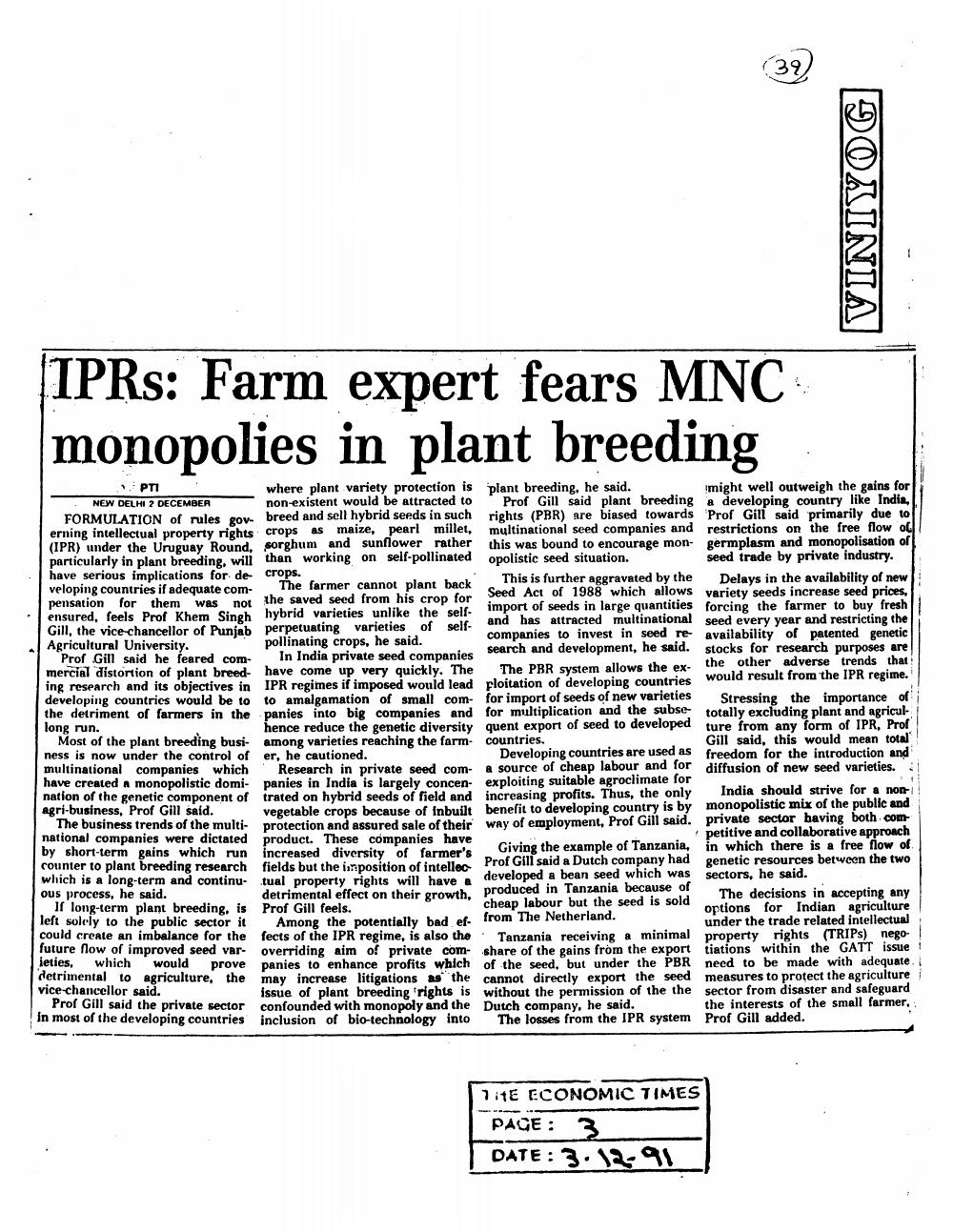________________ VINIYOG IPRs: Farm expert fears MNC monopolies in plant breeding PTI where plant variety protection is plant breeding, he said. might well outweigh the gains for * NEW DELHI 2 DECEMBER non-existent would be attracted to Prof Gill said plant breeding a developing country like India, FORMULATION of rules goy breed and sell hybrid seeds in such rights (PBR) are biased towards "Prof Gill said primarily due to erning intellectual property rights crops as maize, pearl millet, multinational seed companies and restrictions on the free flow of (IPR) under the Uruguay Round, sorghum and sunflower rather this was bound to encourage mon- germplasm and monopolisation of particularly in plant breeding, will then working on self-pollinated opolistic seed situation. seed trade by private industry. have serious implications for de crops. This is further aggravated by the Delays in the availability of new veloping countries if adequate com- The farmer cannot plant back Seed Act of 1988 which allows variety seeds increase seed prices, pensation for them was not the saved seed from his crop for import of seeds in large quantities forcing the farmer to buy fresh ensured, feels Prof Khem Singh hybrid varieties unlike the selfGill, the vice-chancellor of Punjab perpetuating varieties and has attracted multinational seed every year and restricting the of self companies to invest in seed re availability of patented genetic Agricultural University. pollinating crops, he said. Prof Gill said he feared com- search and development, he said. stocks for research purposes are In India private seed companies mercial distortion of plant breed have come up very quickly. The The PRR cvstem allows the ex. the other adverse trends that ploping countries would result from the IPR regime. ing research and its objectives in IPR regimes if imposed would lead ploitation of developing countries wound developing countries would be to to amalgamation of small com- for import of seeds of new varieties Stressing the importance of the detriment of farmers in the panies into big companies and for multiplication and the subse, totally excluding plant and agricullong run. hence reduce the genetic diversity quent export of seed to developed ture from any form of IPR, Prof Most of the plant breeding busi- among varieties reaching the farm countries. Gill said, this would mean total ness is now under the control of er, he cautioned. Developing countries are used as freedom for the introduction and multinational companies which Research in private seed com- a source of cheap labour and for diffusion of new seed varieties.: have created a monopolistic domi- panies in India is largely concen- exploiting suitable agroclimate for nation of the genetic component of trated on hybrid seeds of field and increasing profits. Thus, the only India should strive for a nonAgri-business, Prof Gill said. vegetable crops because of inbuilt benefit to developing country is by monopolistic mix of the public and ne business trends of the multi-protection and assured sale of their way of employment, Prof Gill said. private sector having both.com national companies were dictated product. These companies have petitive and collaborative approach by short-term gains which run increased diversity of farmer's Giving the example of Tanzania, in which there is a free flow of counter to plant breeding research fields but the imposition of intellec Prof Gill said a Dutch company had genetic resources between the two which is a long-term and continu- tual property rights will have developed a bean seed which was sectors. he said. ous process, he said. The decisions in accepting any Ir long-term plant breeding, is Prof Gill feels. cheap labour but the seed is sold options for Indian agriculture left solely to the public sector it Among the potentially bad ef- trom ne Netherland. under the trade related intellectual could create an imbalance for the fects of the IPR regime, is also the Tanzania receiving a minimal property rights (TRIPs) negofuture now of improved seed var. overriding aim of private com- share of the gains from the export tiations within the GATT issue ieties, which would prove panies to enhance profits which of the seed, but under the PBR need to be made with adequate detrimental to agriculture, the may increase litigations as the cannot directly export the seed measures to protect the agriculture vice-chancellor said. issue of plant breeding rights is without the permission of the the sector from disaster and safeguard Prof Gill said the private sector confounded with monopoly and the Dutch company, he said. the interests of the small farmer. In most of the developing countries inclusion of bio-technology into the losses from the IPR system Prof Gill added. in their growth, produced in Tanza TiE ECONOMIC TIMES PAGE : 3 DATE: 3.12. 91




